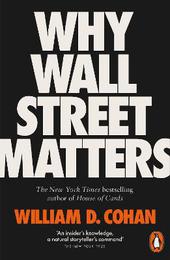
|
Why Wall Street Matters
Paperback / softback
Main Details
| Title |
Why Wall Street Matters
|
| Authors and Contributors |
By (author) William D. Cohan
|
| Physical Properties |
| Format:Paperback / softback | | Pages:192 | | Dimensions(mm): Height 198,Width 129 |
|
| Category/Genre | International finance
Corporate finance
Banking |
|---|
| ISBN/Barcode |
9780141986425
|
| Classifications | Dewey:332.64273 |
|---|
| Audience | | Tertiary Education (US: College) | | Professional & Vocational | |
|---|
|
Publishing Details |
| Publisher |
Penguin Books Ltd
|
| Imprint |
Penguin Books Ltd
|
| Publication Date |
22 February 2018 |
| Publication Country |
United Kingdom
|
Description
A fiery defence of the banks and a stark reminder of why we should all want them to thrive, from New York Times bestselling author William D. Cohan If you like your smartphone or your widescreen TV, your car or your pension, then, whether you know it or not, you are a fan of Wall Street. William D. Cohan, bestselling author of House of Cards, has long been critical of the bad behaviour that plagued much of Wall Street in the years leading up to the 2008 financial crisis, and, as an ex-banker, he is an expert on its inner workings as well. But in recent years he has become alarmed by the vitriol directed at the bankers, traders and executives who keep the wheels of our economy turning. Why Wall Street Matters is a timely and trenchant reminder of the dire consequences for us all if the essential role these institutions play in making our lives better is carelessly curtailed.
Author Biography
William D. Cohan is the New York Times bestselling author of The Price of Silence, Money and Power, House of Cards, and The Last Tycoons, which won the 2007 FT/Goldman Sachs Business Book of the Year Award. He is a special correspondent at Vanity Fair and writes a biweekly opinion column in The New York Times. He has also written for theFinancial Times, Bloomberg BusinessWeek, Fortune, The Atlantic, The Nation, and The Washington Post, among other publications. Cohan is a graduate of Duke University, Columbia University School of Journalism, and the Columbia University Graduate School of Business.
|